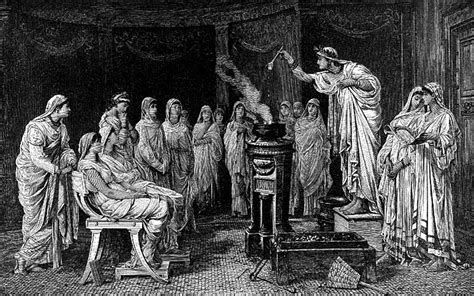
(*All Bible verses are from the NIV unless otherwise noted)
Chapter 13
16 It also forced all people, great and small, rich and poor, free and slave, to receive a mark on their right hands or on their foreheads,
17 so that they could not buy or sell unless they had the mark, which is the name of the beast or the number of its name.
18 This calls for wisdom. Let the person who has insight calculate the number of the beast, for it is the number of a man. That number is 666.
Rev 13:16
It also forced all people… to receive a mark on their right hands or on their foreheads:
John is witnessing an evil parody of how God symbolically “seals” those whom He has redeemed from the world:
Rev 7:3 “Do not harm the land or the sea or the trees until we put a seal on the foreheads of the servants of our God.”
Rev 9:4 They were told not to harm the grass of the earth or any plant or tree, but only those people who did not have the seal of God on their foreheads.
Many Orthodox and Conservative Jewish men and some women wear tefillin (phylacteries) in the synagogue. Inside the tefillin are handwritten parchments with texts from Deut 6:6.
Deut 6:6 These commandments that I give you today are to be on your hearts. 7 Impress them on your children. Talk about them when you sit at home and when you walk along the road, when you lie down and when you get up. 8 Tie them as symbols on your hands and bind them on your foreheads.

The tefillin consists of two black leather boxes, one to be strapped to the forehead and the other to the biceps. The straps of one box are wound seven times around the forearm. The second box is worn on the forehead at the hairline. Both remind the wearer to keep God’s words in both mind and action in fulfillment of that commandment1.
When a package is sealed, its contents are protected from outside contamination and kept fresh and intact. Similarly, believers are sealed to God and protected from Satan‘s plan of destruction. On the other hand, those who reject God and His freely given redemption through Christ are sealed to the Enemy’s plans and purposes.
Many Jewish leaders vehemently rejected Jesus’ message. They were concerned about the influence Jesus was having on the people. He was drawing large crowds and generating a lot of excitement, which the Roman authorities did not approve of. In the past, Rome had taken severe action against anything that appeared rebellious or caused unrest. The Jewish leaders feared this reaction and were prepared to sacrifice one man to protect their position and safety.
John 11:48 If we let him go on like this, everyone will believe in him, and then the Romans will come and take away both our temple and our nation.” 49 Then one of them, named Caiaphas, who was high priest that year, spoke up, “You know nothing at all! 50 You do not realize that it is better for you that one man die for the people than that the whole nation perish.”
In much the same way, Ideologies such as Nazism, Communism, and Socialism prioritize the state over the individuals within it. This can lead to the belief that any action to further the ideology, regardless of its morality, is justified. This has always led to the abuse and suppression of human rights.

Some modern ideologies suffer from the same fatal flaw. They believe that the individual is subordinate to their concepts and that the rights and liberties of the individual can be suppressed to maintain their cause. This can lead to division, hatred, and violence. When an ideology gains enough popular power and support, there is potential for abuse within any society.
Those who oppose or question those ideas – individuals who do not adhere to that belief system – can be canceled, marginalized, or even demonized to the extent that they are refused the rights and freedoms enjoyed by those in power.
Rev 13:17
The mark, which is the name of the beast or the number of its name:
John is seeing an illustration of the all-pervading presence of the beast – all things that oppose Christ’s gospel of love and redemption.
The Book of Martyrs, written by John Foxe and first published in 1563, explains that the Decian persecution was the seventh instance of Roman emperors ordering the persecution of the Christian sect. While Rome had previously attempted to suppress the growth of Christianity, most of these efforts were limited to specific regions rather than empire-wide decrees (see Diary of Perpetua, a martyr of the Decian Persecution, Appendix).
Philip Schaff (1819-1893), in his History of the Christian Church2, describes Decius (Emperor, 249-251):
An earnest and energetic emperor, in whom the old Roman spirit once more awoke, resolved to root out the church as an atheistic and seditious sect, and in the year 250 published an edict to all the governors of the provinces, enjoining return to the pagan state religion under the heaviest penalties. This was the signal for a persecution which, in extent, consistency, and cruelty, exceeded all before it.
In 250 AD, Decian ordered everyone (except for the Jews) to burn incense and offer sacrifices to the Roman gods before a magistrate. The emperor’s purpose was not just the destruction of individual believers but the complete annihilation of the Christian religion itself. Bishops and priests were tortured and executed. Believers were forced to renounce their faith and embrace paganism.

To test their loyalty to the emperor, they were to perform certain rituals such as sacrificing, pouring libations, or burning incense before his image3. A libellus was often signed and witnessed by the officials, proving a person had complied. No original texts of Decius’ edicts have been found, but several Libelli papyrus have been discovered and dated around AD 2504. One found in Egypt reads:
To those in charge of the sacrifices of the village Theadelphia, from Aurelia Bellias, daughter of Peteres, and her daughter Kapinis. We have always been constant in sacrificing to the gods, and now too, in your presence, in accordance with the regulations, I have poured libations and sacrificed and tasted the offerings, and I ask you to certify this for us below. May you continue to prosper. (Second person’s handwriting) We, Aurelius Serenus and Aurelius Hermas, saw you sacrificing. (Third person’s handwriting) I, Hermas, certify. The first year of the Emperor Caesar Gaius Messias Quintus Traianus Decius Pius Felix Augustus, Pauni 27. certifying that the bearer has sacrificed to the gods.5
Schaff recounts how Bishop Cyprian of Carthage addressed his concern that many nominal Christians had surrendered and sacrificed to the gods of the State (sacrificati) or illegally obtained libellatici, stating that they had complied with the government orders. Many thousands of Christians fled to safer areas or refused the State’s demand to sacrifice to the Roman gods. Those who gave in and sacrificed (the lapsi) were often excommunicated. One of those who confessed Christ and refused to offer a sacrifice to the State wrote to Cyprian:
What more glorious and blessed lot can fall to man by the grace of God, than to confess God the Lord amidst tortures and in the face of death itself; to confess Christ the Son of God with lacerated body and with a spirit departing, yet free; and to become fellow sufferers with Christ in the name of Christ?6

Do we, as believers, hide our faith for fear of being made fun of or ridiculed at work or school? In some instances, has the Christian community failed to take a stand on civic or political issues out of apathy or fear? In what ways do we hide Christ’s light under a basket, allowing darkness to reign rather than light?
Bearing witness of Christ doesn’t mean carrying signs telling people they’re going to hell! That kind of “evangelism” has never worked and has continued to mark Christians as intolerant and vindictive. The most effective evangelism is living a life in relationship with God and His Christ that witnesses healing, forgiveness, love, and peace:
Rom 12:12 Be joyful in hope, patient in affliction, faithful in prayer.
1Cor 13:4 Love is patient, love is kind. It does not envy, it does not boast, it is not proud.
Eph 4:2 Be completely humble and gentle; be patient, bearing with one another in love.
1Thess 5:14 And we urge you, brothers and sisters, warn those who are idle and disruptive, encourage the disheartened, help the weak, be patient with everyone.
Matt 5:40 And if anyone wants to sue you and take your shirt, hand over your coat as well. 41 If anyone forces you to go one mile, go with them two miles. 42 Give to the one who asks you, and do not turn away from the one who wants to borrow from you. 43 “You have heard that it was said, ‘Love your neighbor and hate your enemy.’ 44 But I tell you, love your enemies and pray for those who persecute you, 45 that you may be children of your Father in heaven…
Luke 6:30 Give to everyone who asks you, and if anyone takes what belongs to you, do not demand it back.
The world says this is a crazy way to live! You can’t let people walk on you! You have to take what you deserve! Make people pay if they misuse you! Selfless love and compassion seem foolish to the world:
1Cor 1:18 For the message of the cross is foolishness to those who are perishing, but to us who are being saved, it is the power of God.
1Cor 1:25 For the foolishness of God is wiser than human wisdom, and the weakness of God is stronger than human strength.
1Cor 2:14 The person without the Spirit does not accept the things that come from the Spirit of God but considers them foolishness, and cannot understand them because they are discerned only through the Spirit.
Rev 13:18
This calls for wisdom. Let the person who has insight calculate the number of the beast, for it is the number of a man. That number is 666:
This verse has arguably resulted in more debates, books, and movies than any other. However, the interpretation lies within the verse itself – 666 is the number of man.
Consider these translations, all equally accurate (emphasis added):
LSB: Here is wisdom. Let him who has understanding calculate the number of the beast, for it is the number of man; and his number is 666.
NET: This calls for wisdom: Let the one who has insight calculate the beast’s number, for it is man’s number, and his number is 666.
RSV: This calls for wisdom: let him who has understanding reckon the number of the beast, for it is a human number, its number is six hundred and sixty-six.
This grammatical difference implies that the number ‘666’ represents humanity as a whole rather than an individual.
Many scholars have used gematria7 to convert 666 into a name. Gematria was used by the Jews and the Greeks. They devised a way in which a single word could yield several values depending on the cipher used. For example, in English, we might use 1 for A, 2 for B, 3 for C, and so on. Every word and every proper name can be rendered as a number.
Theories interpreting the cryptic number 666 are endless. Writers have maneuvered the number to fit whatever nemesis was popular at the time. It has been taken to mean the Pope, John Knox, Martin Luther, Napoleon, and many others. For example, if A = 100, B = 101, C = 102, D = 103, and so on, the following cipher appears:
107 = H, 108 = I, 119=T, 111=L, 104=E, 117=R, and the sum of the numbers = 666
Other writers have insisted upon the name Emperor Nero as the solution. While the numbers corresponding to the Greek alphabet do not add up (Neron totals 1,005), the Greek name Neron Kaisar, transliterated into Hebrew (which has no vowels), yields 666:
nun = 50, resh = 200, waw = 6, nun = 50, qoph = 100, samech =60, resh = 200, = 666
Scholars who view John’s revelation as symbolic rather than literal reject Gematria. There are so many names that can add up to 666 (most of these require converting names to other languages or adding titles when convenient), that it’s impossible to come to a consensus.
The symbolic view envisions the number not as a code to be broken but as a symbol to be understood. As we have seen in this study, numbers are used figuratively throughout the Bible, and this number can be interpreted allegorically as well. Translating the phrase as “man’s number” or “a human number” would be consistent with the symbolic nature of the vision.
Seven is the number of perfection and the completeness of God’s plans: Seven days of creation, seven churches, seven seals, seven trumpets, seven bowls…
Six is seen as the number of man and human weakness: Man was created on the sixth day; Men are appointed 6 days to labor, and then they are commanded to rest on the seventh day (Exod 20:9-10); A Hebrew slave had to serve 6 years before he could be released in the 7th year (Ex 21:2); Six years were appointed for the land to be sown and harvested (Exod 23:11)…
Multiples of seven magnifies perfection. 777 compounds flawlessness, order, and completeness.
666 forever falls short and intensifies imperfection.
John clarifies the role of anti-Christ in his address to the early saints:
1John 2:18 Dear children, this is the last hour; and as you have heard that the antichrist is coming, even now many antichrists have come. This is how we know it is the last hour. 19 They went out from us, but they did not really belong to us. For if they had belonged to us, they would have remained with us; but their going showed that none of them belonged to us. 20 But you have an anointing from the Holy One, and all of you know the truth. 21 I do not write to you because you do not know the truth, but because you do know it and because no lie comes from the truth. 22 Who is the liar? It is whoever denies that Jesus is the Christ. Such a person is the antichrist—denying the Father and the Son.
The Apostle identifies the anti-Christ as anyone who denies the Father and the Son. For the Jewish Christians of John’s day, 666 was a clear symbol of apostasy, the mark born by both kings and kingdoms raised up in the dragon’s image to deny God as Creator and Jesus as His Christ. This is another indication that the Apostle did not expect his readers to decipher the name of some tyrant far in the future. His message was a contemporary warning the saints would understand and an eternal principle for Christians throughout time.
Footnotes
- Tefillin (phylacteries): My Jewish Learning, https://www.myjewishlearning.com/article/tefillin-phylacteries/, accessed April 2024. ↩︎
- Schaff, Philip. History Of The Christian Church (The Complete Eight Volumes In One), Kindle Edition, Location number 12947-12968. ↩︎
- Ibid. ↩︎
- The Libelli of the Decian Persecution, The Harvard Theological Review, Vol. 16, No. 4 (Oct., 1923), pp. 345-390 (46 pages), Published by: Cambridge University Press on behalf of the Harvard Divinity School (can be viewed online at https://www.jstor.org/stable/1507673?seq=1#metadata_info_tab_contents). ↩︎
- “P.Mich.inv. 263; Recto.” https://quod.lib.umich.edu/a/apis/x-1608/263_a.tif. University of Michigan Library Digital Collections. Accessed: October 24, 2021. ↩︎
- Schaff, History of the Christian Church, location 1268. ↩︎
- Gematria: the practice of assigning a numerical value to a name, word, or phrase according to an alphanumerical cipher. ↩︎
*All Scripture quotations, unless otherwise indicated, are taken from the Holy Bible, New International Version®, NIV®. Copyright ©1973, 1978, 1984, 2011 by Biblica, Inc.™ Used by permission of Zondervan. All rights reserved worldwide. www.zondervan.comThe “NIV” and “New International Version” are trademarks registered in the United States Patent and Trademark Office by Biblica, Inc.™





